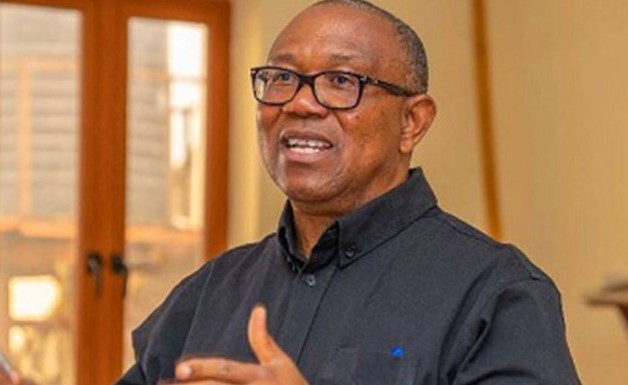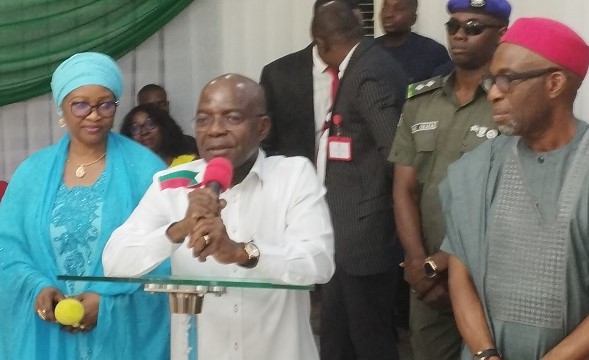The outgone Sole Administrator of Rivers State, Vice Admiral Ibok-Ete Ibas (retd), has formally handed over the reins of power to Governor Siminalayi Fubara, marking the end of a turbulent six-month period of emergency rule.
Ibas declared that the mandate given to him by President Bola Tinubu had been “fully accomplished”, noting that law and order had been restored after the deep political crisis that engulfed the state in March.
President Tinubu lifted the emergency on Wednesday, September 17, allowing Governor Fubara, his deputy, Ngozi Odu, and members of the Rivers State House of Assembly to resume their constitutional duties the following day.
Ibas: ‘The mandate has been accomplished’
In a statewide broadcast, Ibas recalled the circumstances under which he assumed control of the state.
“Six months ago, President Bola Tinubu entrusted me with the solemn responsibility of steering Rivers State through an extraordinary moment in its history. Today, I can say with conviction that by the grace of God and through our collective efforts, the mandate has been accomplished,” he said.
He listed his achievements: restoration of law and order, conduct of local government elections, reconstitution of statutory boards and commissions, and the passage of the state budget by the National Assembly to provide a legitimate fiscal framework for governance.
“May this state never again be brought to the brink of collapse. May we always choose unity over division; dialogue over discord; and progress over paralysis. The Garden City must never lose its fragrance,” he warned.
Ibas admitted that one of the strongest lessons of the period was the danger of unchecked power. “The exercise of power without restraint can cripple institutions, and rivalry without dialogue clearly endangers democracy,” he noted.
Rivers Assembly Resumes Work
On Thursday morning, the Rivers State House of Assembly reconvened after six months of suspension. The session, presided over by Speaker Martins Amaewhule, was held in the temporary conference hall at the legislative quarters, since the official chamber at Moscow Road had been destroyed during the crisis.
The 27 lawmakers had quietly returned to Port Harcourt before the emergency rule lapsed. At plenary, they unanimously adopted a motion calling for a full review of funds spent by the Sole Administrator during his tenure.
House Leader Major Jack, supported by Deputy Leader Linda Somiari-Stewart and seven others, sponsored the motion. He reminded members that the Assembly neither saw nor contributed to the emergency budget that guided the state for six months.
“Several contracts were awarded and funds spent from the state’s Consolidated Revenue Account by the outgone Administrator. It is necessary to establish a clear picture of what transpired,” Jack stated.
He also urged Governor Fubara to submit the list of commissioner nominees for the constitution of a new State Executive Council and forward a fresh appropriation bill for the remainder of the year.
Speaker Amaewhule put the motion to a voice vote, and all 26 lawmakers present backed it. He assured that the Assembly would write formally to the governor requesting compliance.
Fubara Faces New Expectations
The return of Governor Fubara has been met with celebrations in Port Harcourt and beyond. Crowds stormed Government House on Wednesday night, awaiting his resumption. But legislators have already made it clear that the governor must urgently align his administration with the aspirations of the people.
The Assembly called for a new financial plan and for strict adherence to the peace agreement that restored democratic institutions in the state. Lawmakers stressed the importance of transparency in contracts and spending, hinting at possible investigations into the emergency administration.
Political watchers believe Fubara must quickly bridge divides in the state’s political class, appoint commissioners, and roll out a governance roadmap that reassures both citizens and investors.
Adegboruwa: No Cause for Celebration
Even as Rivers celebrated the return to civilian rule, human rights lawyer Ebun-Olu Adegboruwa, SAN, poured cold water on the jubilation. Speaking on Channels Television’s The Morning Brief, he said the state of emergency was an assault on constitutional governance.
“I do not see any cause for celebration in any way. If people exercise their mandate to elect others into office, as they did to Siminalayi Fubara and all the members of the House of Assembly, it is a sacred mandate that should be preserved at all costs,” he said.
He questioned whether President Tinubu acted within his constitutional limits by suspending elected officials.
“Whether the President should have sacked the governor, whether he should have suspended all democratically elected officers of Rivers State in the course of this crisis—those are matters that the court must determine one way or the other,” Adegboruwa argued.
The lawyer urged for judicial clarification of Section 305 of the Constitution, which empowers the President to declare a state of emergency. He described it as “a controversial provision” that leaves gaps about the extent of presidential authority.
The Road Ahead
Ibas has now bowed out, urging Rivers people to give Governor Fubara their full support. “Leadership and followership is a shared responsibility,” he said.
But his warning lingers: democracy cannot survive without restraint, dialogue, and respect for institutions. The Assembly’s demand for accountability and Adegboruwa’s legal challenge both show that the Rivers crisis is far from forgotten.
The lesson for Nigeria may be even larger: how to protect the sanctity of the people’s mandate while preventing political crises from crippling governance.
Rate, Like 👍, Comment💬, share this article and Follow us on our social media handles. You can also Submit your own story to get featured and earn rewards!








